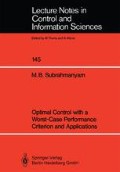Abstract
In this chapter a state space formulation of the H ∞ optimal control problem is given. Assuming a finite interval of control, the problem of synthesizing a finite-interval H ∞ controller is converted into an optimization problem in which a parameter occurring in a boundary value problem needs to be maximized. An optimality condition for the maximization of this parameter is given. The proposed method makes use of the observer-based parametrization of all stabilizing controllers. An example is worked out.
Preview
Unable to display preview. Download preview PDF.
References
G. Zames, Feedback and optimal sensitivity: Model reference transformations, multiplicative seminorms, and approximate inverses, IEEE Trans. Automat. Contr., Vol. AC-26, No. 2, 1981, 301–320.
B. A. Francis and J. C. Doyle, Linear control theory with an H∞ optimality criterion, SIAM J. Control Optim.25, 1987, pp. 815–844.
B. A. Francis, “A Course in H∞ Optimal Control Theory,” Lecture Notes in Control and Information Sciences, Vol. 88, Springer-Verlag, Berlin, New York, 1987.
J. Doyle, K. Lenz, and A. Packard, “Design examples using μ-synthesis: Space shuttle lateral axis FCS during reentry,” Proc. IEEE Conf. on Decision and Control, 1986.
J. Doyle, K. Glover, P. Khargonekar, and B. Francis, “State-space solutions to standard H2 and H∞ control problems,” Proc. Amer. Control Conf., 1988, pp. 1691–1696.
K. Glover and J. Doyle, State space formulae for all stabilizing controllers that satisfy an H∞ norm bound and relations to risk sensitivity,” Systems and Control Letters11, 1988, pp. 167–172.
H. Kimura and R. Kawatani, “Synthesis of H∞ controllers based on conjugation,” Proc. 27th IEEE Conf. Decision and Control, 1988, pp. 7–13.
D. S. Bernstein and W. M. Haddad, LQG control with an H∞ performance bound: A Riccati equation approach, IEEE Trans. Automat. Contr.34, 1989, pp. 293–305.
M. B. Subrahmanyam, “Optimal disturbance rejection in time-varying linear systems,” Proc. Amer. Control Conf., 1989, pp. 834–840.
J. C. Doyle, “Lecture Notes, ONR/Honeywell Workshop on Advances in Multivariable Control,” Minneapolis, MN, 1984.
B-C. Chang and A. Yousuff, “A Straight-Forward Proof for the Observer-Based Controller Parametrization,” Proc. AIAA GNC Conf., Minneapolis, MN, 1988, pp. 226–231.
E. B. Lee and L. Markus, “Foundations of Optimal Control Theory,” John Wiley, New York, 1967.
L. Lapidus and J. H. Seinfeld, “Numerical Solution of Ordinary Differential Equations,” McGraw-Hill, New York, 1973.
J. L. Kuester and J. H. Mize, “Optimization Techniques with Fortran,” McGraw-Hill, New York, 1973.
Editor information
Rights and permissions
Copyright information
© 1990 Springer-Verlag
About this chapter
Cite this chapter
(1990). Synthesis of finite-interval H ∞ controllers by state space methods. In: Subrahmanyam, M.B. (eds) Optimal Control with a Worst-Case Performance Criterion and Applications. Lecture Notes in Control and Information Sciences, vol 145. Springer, Berlin, Heidelberg. https://doi.org/10.1007/BFb0043626
Download citation
DOI: https://doi.org/10.1007/BFb0043626
Published:
Publisher Name: Springer, Berlin, Heidelberg
Print ISBN: 978-3-540-52822-7
Online ISBN: 978-3-540-47158-5
eBook Packages: Springer Book Archive

